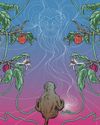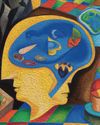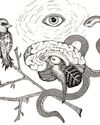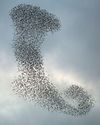
Scattered through Nietzsche’s writings are proclamations of his ‘untimeliness’, expressing the conviction that he will be ‘born posthumously’. He claims that few in his time have ears to hear him, that he must trust in future generations to understand him, and also that he is preparing that future audience. Along with these proclamations goes his prediction that one day his name will be associated with a crisis unprecedented in human history. Nietzsche appears to suggest that his work may help precipitate the most acute stages of this crisis; but he also positions himself as humanity’s guide through and beyond the coming upheaval.
What is the nature of this predicted crisis? The most common reading of it represents, I believe, a misconception or underestimation of its nature and scope. This common idea is that Nietzsche is speaking of the gradual erosion among humankind of our belief in any binding, transcendental values. This process is exemplified by, but not restricted to, the decline in religious faith. Without the foundational belief in a divine sanction for human systems of morality, and without faith in a reward beyond it for our conduct in this brief life, the idea that one’s life and actions (and especially one’s efforts and sufferings) are meaningful becomes inestimably more difficult to accept. The result is nihilism: a renunciation not only of religious belief but also of the sustaining convictions of antiquity that the continued flourishing of the community to which one belonged might supply a suitable end for one’s action.
This story is from the {{IssueName}} edition of {{MagazineName}}.
Start your 7-day Magzter GOLD free trial to access thousands of curated premium stories, and 9,000+ magazines and newspapers.
Already a subscriber ? Sign In
This story is from the {{IssueName}} edition of {{MagazineName}}.
Start your 7-day Magzter GOLD free trial to access thousands of curated premium stories, and 9,000+ magazines and newspapers.
Already a subscriber? Sign In

Anselm (1033-1109)
Martin Jenkins recalls the being of the creator of the ontological argument.

Is Brillo Box an Illustration?
Thomas E. Wartenberg uses Warhol's work to illustrate his theory of illustration.

Why is Freedom So Important To Us?
John Shand explains why free will is basic to humanity.

The Funnel of Righteousness
Peter Worley tells us how to be right, righter, rightest.

We're as Smart as the Universe Gets
James Miles argues, among other things, that E.T. will be like Kim Kardashian, and that the real threat of advanced AI has been misunderstood.

Managing the Mind
Roger Haines contemplates how we consciously manage our minds.

lain McGilchrist's Naturalized Metaphysics
Rogério Severo looks at the brain to see the world anew.

Love & Metaphysics
Peter Graarup Westergaard explains why love is never just physical, with the aid of Donald Davidson's anomalous monism.

Mary Leaves Her Room
Nigel Hems asks, does Mary see colours differently outside her room?

From Birds To Brains
Jonathan Moens considers whether emergence can explain minds from brains.